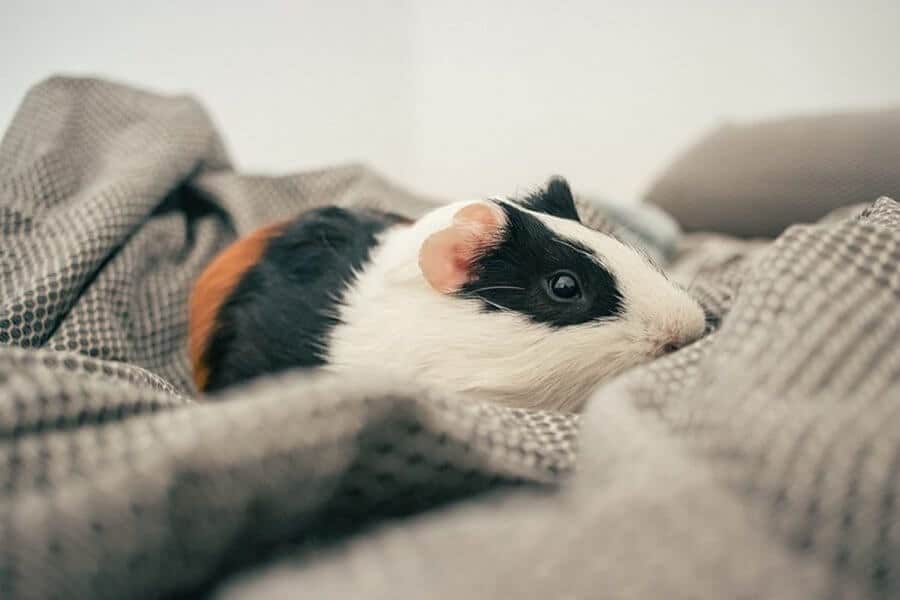Guinea pigs are one of the world’s most unique pets. These loveable rodents have big personalities despite their smaller size. They are typically up to 10 inches (25 cm) in length and can weigh up to 2.6 lbs (1.20 kg). While this isn’t incredibly small, they are still larger than other rodents that are kept as pets such as hamsters or small rats.
While guinea pigs are known for their size and personalities, unfortunately, they have a bad reputation for being stinky. But are these adorable creatures really all that smelly? The answer isn’t exactly cut and dry.
Pets like guinea pigs are often reflected as being exceptionally smelly. The truth of the matter is that, yes, they are smelly. Almost any pet that requires a designated place to relieve their bowels or bladders is going to have a smell. This even includes cats and their litter boxes.
They generally relieve themselves wherever they are within their cage environments. When the feces and urine sit around a bit too long, it can cast off an unpleasant smell. Typically, the urine smell will be more present than a smell from their droppings. Their droppings are pellet-shaped and much easier to clean up than urine.
Considering that guinea pigs must do their business within their cage, it is important to maintain the cage as much as possible to relieve some of the unpleasant smells associated with them. Some guinea pigs are capable of being litter trained.
When the term “litter trained” is used, it is important to note that guinea pigs aren’t using typical litter as cats do. In fact, that would be dangerous to their fragile respiratory systems due to the dust that cat litter often puts off.
When referring to litter training in respect to guinea pigs, it means that a designated spot in their cage has been set up with paper bedding in a container that they can climb in and out of. Not all guinea pigs will catch onto the purpose of the bin, so in general, litter training these creatures is rare.
This isn’t to say that they aren’t smart it’s just that they are a creature of habit and the purpose of the bin isn’t immediately known to them.
Aside from the associated urine (and sometimes feces) smell, guinea pigs do not have a distinct smell. For example, ferrets produce a scent from their glands that is a strong musky smell. This is a huge identifier for a ferret and almost all of them produce this strong scent. Guinea pigs do not produce such a scent and don’t particularly smell of anything.
The only time a guinea pig will have an unpleasant smell on their actual bodies (not their cage conditions producing a smell) is if they have been sitting in their own urine for too long. This makes their fur wet and their bottoms become quite stinky.
This is yet another reason to maintain their cages on a regular basis so that the condition of their fur stays as healthy as possible.
Do Guinea Pigs Need Baths?
Typically, if a guinea pig’s cage is clean they will not need a bath. In fact, guinea pigs clean themselves through a white substance that is secreted from their eyes. They then use their paws to wipe their fur down around their faces and belly areas.
This process is quite entertaining to watch! Their bodies know they need this secretion and produce it accordingly.
Even though guinea pigs do not usually need baths, there are certain times that giving them a bath might be necessary. It is important to know when bathing them might be appropriate. Below are the reasons a guinea pig might need a bath.
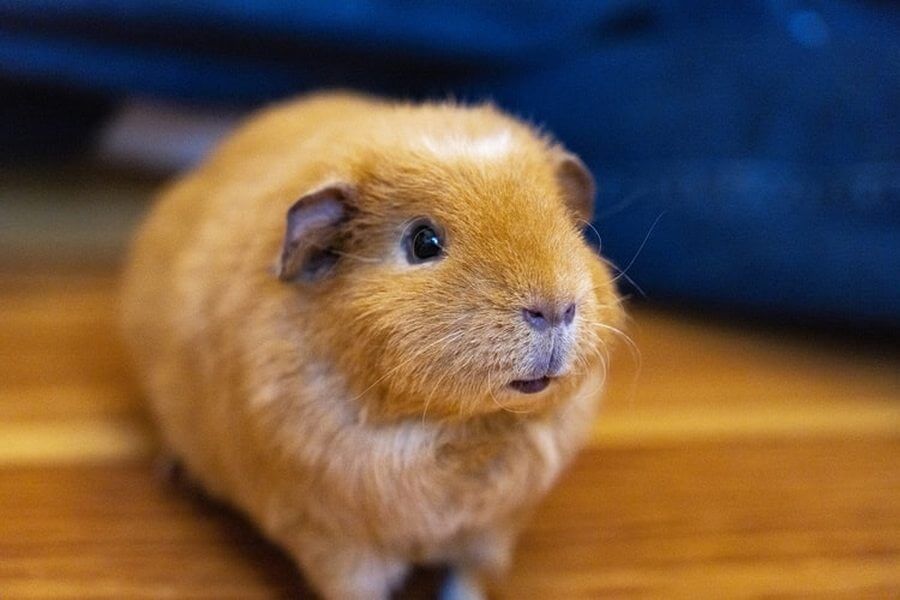
Reasons A Guinea Pig Might Need A Bath
They Have Longer Fur Around Their Bottoms
Some breeds of guinea pigs have longer fur which needs to be brushed, trimmed, and regularly washed. In doing so, this ensures the guinea pig doesn’t get a build-up of feces clumps around their bums. Their long fur can get feces trapped around the bum area.
Regularly trimming around the bum can reduce this build-up, however, it is still possible for them to get dirtier quicker than other breeds. The breeds of guinea pigs known for their long hair include Peruvian, Texel, Coronet, and Sheba. Some Abyssinian guinea pigs can have longer hair around the bottom, but usually, their fur length doesn’t get as drastic as the longer-haired breeds.
They Are Older And Cannot Clean Themselves Anymore
Older guinea pigs require a bit more care than younger ones. When guinea pig reaches 5 or older, they are considered to be senior piggies. They start moving a bit slower and may not be cleaning themselves as regularly as they used to.
In this case, it is important to help them out by giving them a little bath. The primary focus of the bath should only be their bottoms where they may be experiencing urine on their back leg fur and underside belly areas.
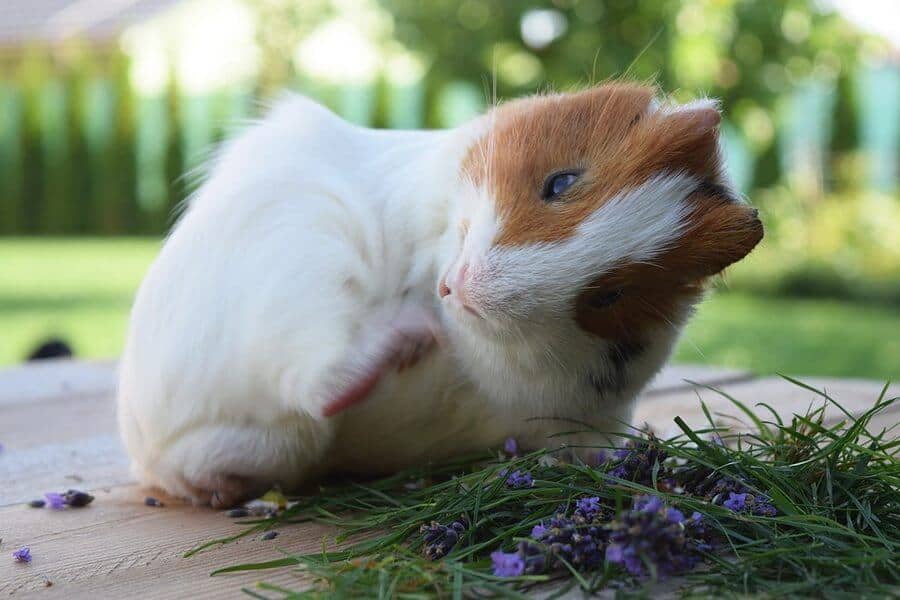
They Are Messy Eaters When Eating Fruit Or Vegetables
It is no secret that guinea pigs love their fruits and vegetables. They often get excited about their favorite treats and waste no time devouring them. If the fruit or veggie is particularly messy, a guinea pig might get stains on the fur that is around their mouths.
Fruits like strawberries and blueberries are the biggest culprits. However, some vegetables can cause green discoloration like very wet green peppers or cucumbers. Giving them a quick bath to wash around their chin and mouth areas can help get their fur back to its normal color in no time.
While guinea pigs do not need regular bathing, these situations could warrant the need for a bath. If a guinea pig needs a bath, it is critical to know how to bathe them. It isn’t as easy as sticking them in a tub of water.
In fact, guinea pigs should never be submerged in deep water as they are not known for swimming and can drown. Below are some tips for how to bathe a guinea pig!
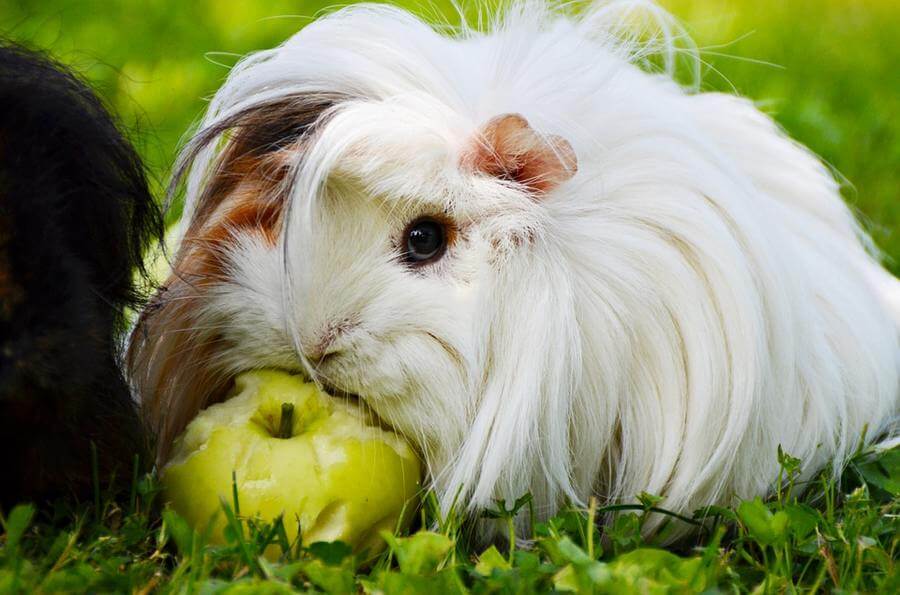
Tips For Bathing A Guinea Pig
Have A Towel Ready
Guinea pigs are prey animals. They find great comfort in having something to hide in, burrow in, or feel comfortable in. Having a towel ready for after the bath is important. It not only helps dry their fur as much as possible but gives them the opportunity to burrow if they want to.
Guinea pigs do not usually like water or baths. So after giving them one, the towel gives them the comfort they need to feel safe from the overall experience.
Do Not Use Hot Water
Guinea pigs are fragile animals. From their tiny bones to their skin under their fur, they can be sensitive. They are known to survive best in temperatures of 65-75 degrees Farenheit (or 18-23 degrees Celsius). This is just air temperature around them.
Some water can produce much higher temperatures. A good rule of thumb is to test the water by feeling it on a wrist or open hand. If the water is too hot for a human, it is much too hot for a guinea pig.
Alternatively, they should not get extremely cold baths either. A barely warm temperature is ideal. It ensures that the water isn’t too hot or cold. Considering that the piggie shouldn’t be submerged in the water, finding a good temperature shouldn’t be too hard.
Using a small cup to pour the water on the guinea pig’s back, belly, bum, and hind legs are ideal.
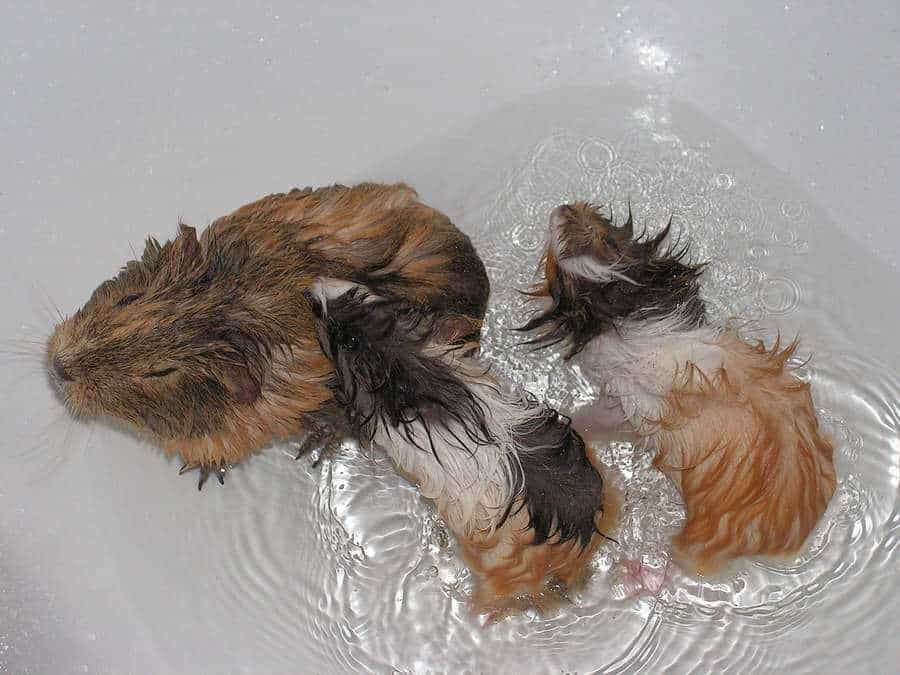
Do Not Submerge A Guinea Pig In Water
Guinea pigs are not good swimmers. Under no circumstances should a guinea pig be submerged in a tub or sink full of water. The best way to bathe them is in an empty tub with a small cup handy to pour the water on their bodies. It can also be done in a small sink in the same way.
If no small cup or bowl is handy, a sink should be used and the water should only be filled up to cover their legs and belly areas and no higher. Their ears and face should never get wet. If their chin or mouth needs to be cleaned, it is easy to reach these areas without putting them under a lot of water.
Use Baby Shampoo
Baby shampoo is a great way to get guinea pigs squeaky clean. It is delicate enough to use on their sensitive skin and fur. Moreover, it doesn’t have harsh chemicals or scents that other soaps or shampoos can have. It is also important to note that a little goes a long way.
Small quarter size of soap is enough for their bottoms and under their legs. An additional quarter-size dollop can be used for their bellies and backs. The baby shampoo also rinses out really easily, so guinea pigs do not have to be subjected to water for a long period of time.
Use A Guinea Pig Approved Bathing Spray
Bathing a guinea pig can be as easy as using a spritzing spray made for guinea pigs. These sprays are an alternative to using shampoo or water. They can be lightly sprayed on the guinea pig’s fur and carefully brushed through with a small comb.
This shouldn’t be too often as it really isn’t good for their fur or skin. However, it is a nice option to have aside from using water. It can be done once a month to keep their fur clean. It is important to note that this will not eliminate any built-up feces around the bum area. This would still require a bath with water.
These bathing tips can make a guinea pig’s bath time a success. They will ensure that a guinea pig safely gets a bath while getting critical problem areas clean!
How Do I Stop My Guinea Pig From Smelling?
As expressed before, guinea pigs are only going to smell if their cages aren’t cleaned regularly and if they are consistently sitting in their own urine or feces and it becomes embedded in their fur. Keeping a guinea pig cage clean is the biggest step in preventing a guinea pig from smelling.
While the smell will not be completely eliminated, it can be greatly reduced. Below are some key tips in reducing the smell of guinea pig urine or feces!
Tips For Reducing Smells Associated With Guinea Pigs
Clean Their Cage At Least Once A Week
Maintaining a clean cage is the key way to reduce guinea pig-related smells. The most popular type of bedding for a guinea pig is paper bedding. Paper bedding absorbs urine quickly and pellet poops fall between the bedding rather than sitting directly on top.
The downside to paper bedding is that the smell of urine can be noticed quickly if the cage isn’t regularly cleaned. Using puppy pads under the paper bedding can help reduce urine smells but the paper bedding should still be changed out once a week. Spot cleaning of regularly used areas of the cage may be necessary between total cage cleanouts.
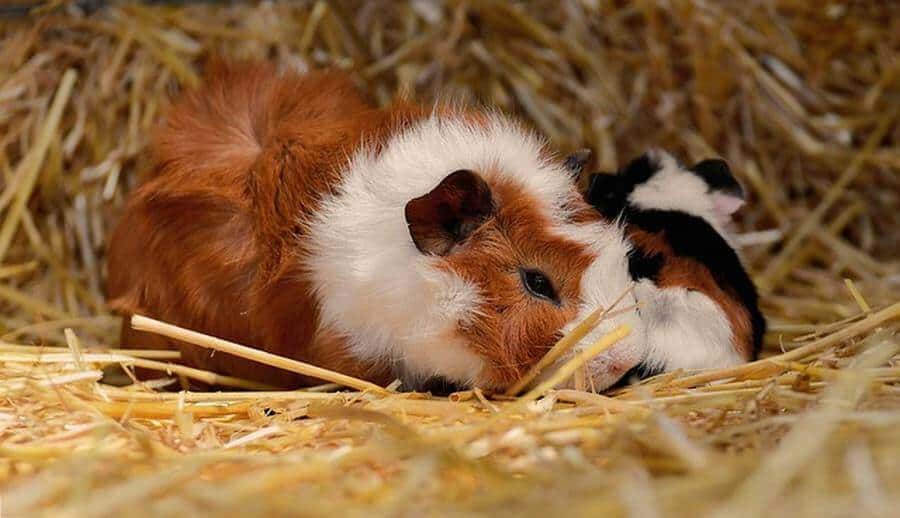
For guinea pig owners who choose to use fleece bedding, urine smells can arise quicker than paper bedding cages. This is because fleece bedding doesn’t always absord urine properly. This is particularly true if the bedding hasn’t been prepped correctly to help wick away moisture.
While cleaning up pellet poops is easier for fleece users, the urine smell is usually more noticeable. Puppy pads can be placed under the fleece to aid in smell reduction just like the paper bedding.
Put Baking Soda Near Their Cage
Baking soda is a wonderful scent catcher. It is used in other ways around the house to help reduce smells. It absorbs unpleasant smells quickly and helps keep the air clear of unsavory smells. Placing a small box of baking soda near a guinea cage (not inside of it!) can help trap urine smells.
This should not be used as an alternative to actually cleaning the cage. It should only be used in combination with regular cleaning of the cage. Baking soda can act as a buffer to reduce smells between weekly cage cleanouts.
Invest In An Air Purifier
Air purifiers are excellent devices to have in your home. Their cycle air through a special filter to redistribute cleaner air. They come in various sizes to cover certain amounts of space. Investing in a small air purifier to place near a guinea pig cage is a unique way to reduce unpleasant smells.
It can help recycle the air around the cage to produce cleaner air. Once again, these should not be used to mask the smell of the cage and shouldn’t be the only method of reducing cage-associated smells. Regularly cleaning the cage is the number one way to keep piggies smelling their best.
Cleaning a guinea pig cage can be paired with the baking soda or air purifier to further keep the area smelling great. Guinea pigs are a responsibility like any other pet. They aren’t able to help their urine or feces smell and rely on their owners to keep their cages clean.
Keeping a clean cage not only keeps the gross smells to a limit but keeps piggies in better health as well.
Do Male Or Female Guinea Pigs Smell More?
Male guinea pigs will also smell more than female guinea pigs. In fact, male guinea pigs often a lot of gross smells that can come from a build-up of feces in their bums. However, the biggest reason that males smell more than females is due to their grease gland on their bums.
Right above their bums is a grease gland that produces a slightly slick substance on the surface of their fur. The smell isn’t strong and isn’t anything like what ferrets smell like.
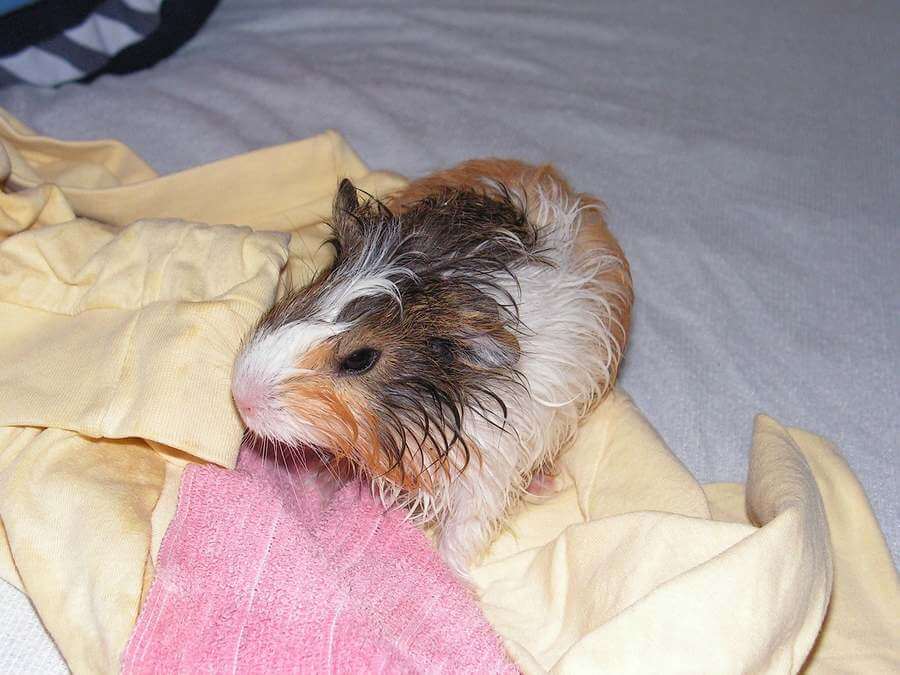
The purpose of the grease gland on a male guinea pig is to help them mark their territory. Additionally, the grease gland is used to attract females during reproduction. Typically, the grease gland produces the grease-like substance and it becomes solid on the fur surface after some time.
This is totally normal. During a bath, the grease gland can be washed. But, it is because of this gland that males can have a stronger scent than females. Although, as expressed before, guinea pigs do not have a strong, distinct smell associated with their species.
With regular maintenance of their cages and baths (when appropriate), guinea pigs can be pleasant pets to have around. They have a reputation for being smelly but in reality, they aren’t necessarily as stinky as some would think!
More Pages On Guinea Pigs
Guinea pigs are one of the world's most unique and adorable rodent pets. These creatures have such large personalities and are often misunderstood. Having a guinea pig as a pet comes with...
Getting a guinea pig for a pet is such an exciting experience! These adorable rodents are quirky pets that are really fun to engage with. Guinea pigs have a reputation of being boring, however, this...


